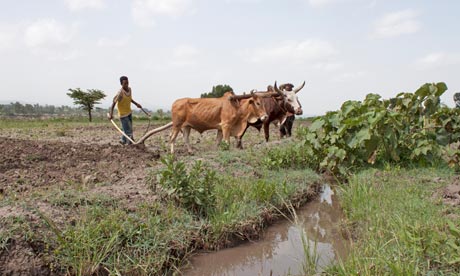
What happens when you are forced to leave the land that has fed your family for generations? What is the impact of wealthy foreigners having access to the best agricultural land in a very poor country? These questions will be addressed in Land Ownership in Ethiopia, the second Guardian film to be shown on the special website, produced in association with Christian Aid.
Ethiopia is one of the most malnourished countries in the world, with more than 13 million people needing food aid. Now its government is offering to lease at least 3m hectares of the most fertile land in the Gambella region to rich countries and individuals. They will use this land to grow and export food, and other goods, for their own populations.
Since 2007, Ethiopia has approved 815 foreign-financed agricultural projects. Any land in Gambella that investors have not been able to buy is being leased for about US$1 a hectare a year. The Ethiopian government is urging investors to grow high-value crops, such as soya beans and palm oil, that will generate revenue for food aid, rather than cereals, which would provide food to eat. These foreign investors include international agri-businesses and UK pension funds, with high rates of return predicted.
Gambella has become one of world's biggest testing grounds for this growing phenomenon of "land-grabbing". Land has already been cleared of the forests that cover much of this region. Several hundred people living in the area's villages have been told they will have to leave their ancestral land so that it can be leased for agricultural projects. Most villagers are refusing to cooperate. The government is threatening to resettle them by force.
So what will be the long-term impact on the people of the Gambella region? How can their future security be assured? And what happens if, as predicted by the Intergovernmental Panel on Climate Change, food production in Africa halves over the next 10 years?
To find out more, watch the film here from Monday 21 March at guardian.co.uk/poverty-over
Ethiopia is one of the most malnourished countries in the world, with more than 13 million people needing food aid. Now its government is offering to lease at least 3m hectares of the most fertile land in the Gambella region to rich countries and individuals. They will use this land to grow and export food, and other goods, for their own populations.
Since 2007, Ethiopia has approved 815 foreign-financed agricultural projects. Any land in Gambella that investors have not been able to buy is being leased for about US$1 a hectare a year. The Ethiopian government is urging investors to grow high-value crops, such as soya beans and palm oil, that will generate revenue for food aid, rather than cereals, which would provide food to eat. These foreign investors include international agri-businesses and UK pension funds, with high rates of return predicted.
Gambella has become one of world's biggest testing grounds for this growing phenomenon of "land-grabbing". Land has already been cleared of the forests that cover much of this region. Several hundred people living in the area's villages have been told they will have to leave their ancestral land so that it can be leased for agricultural projects. Most villagers are refusing to cooperate. The government is threatening to resettle them by force.
So what will be the long-term impact on the people of the Gambella region? How can their future security be assured? And what happens if, as predicted by the Intergovernmental Panel on Climate Change, food production in Africa halves over the next 10 years?
To find out more, watch the film here from Monday 21 March at guardian.co.uk/poverty-over

No comments:
Post a Comment